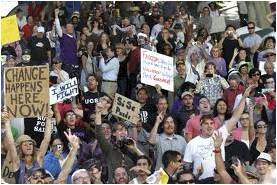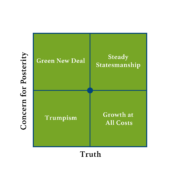“Be Very Alarmed!” Introducing the Global GDP Meter
by Brian Czech
Backed by an ominous sound clip and a rapidly churning GDP meter that comes out of nowhere, “Be alarmed… Be very alarmed!” are the opening phrases at CASSE’s new landing page. You’ll see what we mean shortly; please allow us an introduction to describe this new approach.

When is the last time you were alarmed by a website?
The landing page is actually a 30-second animation prefacing our “regular” website. It is designed to be three things:
- Alarming
- Crystal clear
- Distinctive and memorable
Why Sound the Alarm?
Now it’s true that, no matter how clear you are, you cannot force someone into a feeling or a sense by simply uttering “feel this” or “sense that.” Yet, when Bobby McFerrin sang “Don’t Worry, Be Happy” whose worries weren’t lightened while they listened? McFerrin didn’t demand happiness with mere words; he conduced it with art, effort, and lyrics. His song would never be forgotten by the majority who heard it.
Similarly, we cannot expect the mere words “be alarmed” to actually alarm visitors. That said, with our new landing page, we strive to conduce a sense of alarm, concern, and anxious curiosity.
What You’ll See & Hear
The sound clip that accompanies the animation converts apathy to anxiety in a matter of seconds, reinforcing the terse, tense phrases. Meanwhile the GDP meter comes out of nowhere, surprising visitors expecting a typical website with fixed text and clickable links. Instead, the GDP meter runs rapidly, ruthlessly, and relentlessly, just as real GDP bloats in the real world, thanks in no small measure to the thousands of growth-mongered economic policies operating in and among nations.
Next, visitors see what happens to the environment, the economy, the international community, and national security when the goal is perpetual economic growth. The sequence of photos is like our collective political life flashing before our eyes. We stay on point—as relentlessly as the GDP meter itself—that a perpetually bloating economy is rapidly becoming the biggest threat of the 21st century.

Coal mine in Jahria, India — TripodStories- AB, CC BY-SA 4.0 | San Diego-Tijuana border — U.S. Army photo by Gordon Hyde | Kiev, February 18, 2014 — Аимаина хикари, CC0 1.0
Finally, as the foreboding sound fades, visitors are brought to the regular website with its menu and links. There, they can sign the CASSE position, learn more about steady state economics, or explore CASSE’s organizational network. We expect our visitors to spend a little more time than they would have without the portending preface they’ve just experienced.
Repeat visitors have the option of refreshing the animation, perhaps to investigate the quickly vanishing photos, or proceeding straight to the homepage. That said, even the homepage incorporates the GDP meter, downsized to fit the introductory line. Those with a mathematical or technical bent will even find a page with detailed information, “About the CASSE GDP Meter”.
Why Should I Care?
Now, at CASSE we are abundantly aware that many critics will scoff and scold, “Bad move!” For at least 15 years, commentators have been promulgating the notion that a “progressive” agenda must be presented in the most “positive” of terms. Meanwhile sustainability has been thoroughly (and unnecessarily) lumped under the progressive agenda. The upshot is that nothing but “solutions” seems to get any traction with many foundations, philanthropists, and self-proclaimed “optimists.”
We don’t buy it, and we never have. As realists, we realize that no one searches for real solutions until they recognize real problems. Despite those who loudly exhort (a bit ironically) “don’t be an alarmist,” our assessment is that not nearly enough alarm has yet been raised about limits to growth. Not enough, not smartly enough, and not persistently enough.
The alarm, of course, pertains not only to limits to growth, but especially the implications of breaching those limits. If a majority of people come to recognize the dire environmental, economic, diplomatic, and national-security dangers of overshoot, they will be far more likely to demand steady-state politics and policies. They’ll also consume more conscientiously and help promulgate a consumer ethic in society—and ultimately international diplomacy.
Check Out the CASSE GDP Meter
So, without further ado, we invite you to our new landing page, the non-“positive” one with the ominous sound and the ruthless, relentless GDP meter. If nothing else, we hope you find it distinctive, effective, and important enough to pass along to your friends, family, and networks. You can help, in other words, to sound the alarm—an alarm that leads straight to the steady-state solution.

Brian Czech is the founder and executive director of CASSE.







Hallo
I am Florian Colceag
I completely agree with your efforts. The root of all problems is our way of thinking and the logic we use. We use only the quantitative estimations, and we don’t know how to use qualitative, correlating or relevant information for estimating trigger facts. Me and the institute I developed are focused on these directions, based on a complexity theory that we developed.
If you are interested in a collaboration please let me know
best wishes and good luck with what are you doing
Agreed. I have long questioned the softly, softly “there are villians out there, but together we have hope” approach. In part it is patronising towards adults (although I confess I don’t know how to broach such subjects candidly with young people who shouldn’t be facing the reality they do). A good mix of telling the truth and saying what needs to be done is the way to go.
To me, it is even more alarming than Casse outlines. It seems insane hubris to believe we as one organism within the planet can exist outside the planetary energy budget. How do we not see that the massive infusion of energy at the apex trophic level is anything but destructive? The only sustainable way to live within the planet is to use only energy supplied by plant or animal, energy from outside that provided by the primary producers is not benign.
Please review the Global Resource Bank solution to poverty and pollution – http://www.grb.net.
Brian and CASSE,
Keep up the good work. I’ll check the landing page now and now that Greda is here delivering limits to growth climate impact message, maybe we’ll make some headway. I volunteer with the Overview Institue, which is trying a number of media experiments to help people get it (like all the astronauts have and Jim C above has), akin to what this Oceanographer Biologists is about to experience for 6 months https://phys.org/news/2019-09-fulfilling-earth-space.html.
Heres a crazy idea, which could work maybe a hokkum song (low comedy song) ala Johnny Cash “A Boy named Sue”. One which named and shamed through extreme parody. Who knows….by any means necessary.
The problem I see with this train of thought is that in panic humans make choices through a very narrow view. That worked at an evolutionary scale to get us here but it is ill suited to addressing the current problems we face in anything other than a survival of the fittest at its most raw form. We may end up there anyway but I am looking for a path that does not try to jump us right into that landscape. That said, I think that the meter is a great idea. You should develop an educational tool to accompany it that expands on the problem in accessible terms and offers ideas towards concrete, actionable solutions and make it available for any educational institution at any level anywhere in the world for free. Maybe you have already.